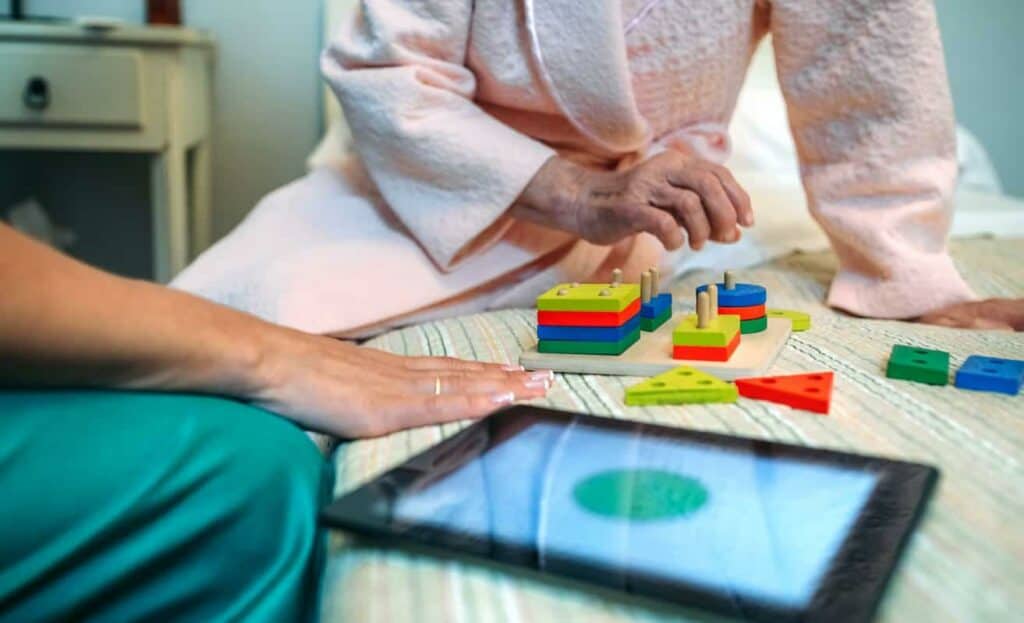
25+ Joyful Indoor Activities for Seniors That Will Transform Their Day
As seasons change in Reno and Carson City, or when mobility becomes a challenge, finding engaging indoor activities for seniors can feel like a difficult
Dementia is an umbrella term used to describe a number of conditions characterized by a decline in cognitive abilities. Typically, the changes in our mental function occur with age and affect our memory, thinking process, and daily functioning.
Understanding the 5-stages of dementia life expectancy, including Alzheimer’s, is crucial for managing the progression of the disease and maintaining a good quality of life for the affected person.
This article gives some insight into the life expectancy of people with dementia and the factors that may affect it.
There are different kinds of dementia, and the life expectancy of people diagnosed with it can vary depending on the specific type and individual factors.

Life expectancy is influenced by the lifestyle of the individual, their access to medical care, and the presence of other medical conditions.
If you are a caregiver or a family member of someone with dementia, you should know that you play a critical role in providing support and enhancing the quality of life for your loved one affected by the condition.
Since dementia is a progressive disease, with its advancing, your beloved’s physical and cognitive abilities will also decline.

Early diagnosis and appropriate care can help improve the management of dementia and the overall well-being of individuals living with the disease.
In the table below you will find the common stages of dementia, typical symptoms you can expect at each, and the associated life expectancies.
Again, keep in mind that these prognoses are overgeneralized and can vastly vary according to individual circumstances.
|
Stage of dementia |
Typical symptoms |
Average life expectancy |
|---|---|---|
|
Early Stage (Mild Cognitive Impairment): |
In the early stage, affected people usually experience mild memory problems, and cognitive difficulties, such as difficulty doing more than one task at a time or being confused. |
Life expectancy is close to the average life expectancy for their age considering any other health problems they may have. Some people in this stage may not progress to more severe forms of dementia. |
| Mild Dementia | In this stage, cognitive and functional impairments become more noticeable. You may notice that your loved one has difficulty with memory, decision-making, and everyday tasks. | At this stage, life expectancy can vary widely. However, on average, it may range from 2 to 10 years, depending on the type of dementia and individual factors. |
| Moderate Dementia | Mental and functional decline become more pronounced. Your beloved would require increasing assistance with daily activities and personal care. | Depending on the type and the individual’s overall health, life expectancy can be anywhere from 2 to 6 years. |
| Severe Dementia | In the severe stage, your loved one may have very limited cognitive function and will need 24/7 care for all daily activities. | Life expectancy at this stage is typically shorter. Specialists often estimate it at 1 to 3 years, depending on the dementia type and individual factors. |
| End-Stage Dementia | This is the final stage of dementia, where individuals are often completely dependent on others for care and may be bedridden. | At this stage, life expectancy is often measured in months, though it can vary. |
It’s important to note that these stages are general guidelines, and the progression of dementia for your loved one can be quite different.
The type of dementia also plays a significant role in life expectancy. For example, Alzheimer’s disease, has a more predictable progression, while other types, like Frontotemporal dementia, may progress differently.
Additionally, if your beloved suffers from concurrent health conditions, such as diabetes, hypertension, cardiovascular disease, and other health problems, those can influence their life expectancy and overall well-being.

The care and support people with dementia receive is another major factor that can impact how long they live with this disease.
That is why your role as a caregiver, together with healthcare providers, is crucial in ensuring that your loved one receives appropriate care and support tailored to their specific needs at each stage of the disease. Proactive planning for their care for each stage is essential and can help manage the condition.
Caring for someone with dementia, especially in its more advanced stages, can be extremely challenging. In 2023, an array of services and resources are available to aid families and caregivers in navigating this difficult journey. If you want to learn more about how to care for your beloved, you can find well-compiled information here.
This includes resources that span from identifying dementia symptoms to exploring treatment options to slow down the progression and providing advice on managing daily challenges like eating and swallowing difficulties, sleep disruptions, confusion, incontinence, and weight fluctuations.
Providing a good quality of care involves comprehensive education and training, emphasizing a person-centered approach that tailors care to their unique preferences and history.

The best care is professional dementia care which places like Amy’s Eden can offer. It consists of effective communication, behavior management, medication administration, and safety measures.
Professionals with proper training and acquired experience can successfully find ways to engage the people they care for in meaningful activities and conduct regular assessments of their condition and vital signs.
Collaboration with healthcare professionals and family members, along with adherence to legal and ethical considerations, is crucial to providing high-quality care with compassion and respect, always focusing on your loved one’s dignity and well-being.
Need professional and compassionate caregivers for your loved one? Contact us today.
Get care >

As seasons change in Reno and Carson City, or when mobility becomes a challenge, finding engaging indoor activities for seniors can feel like a difficult
Family Survey Please share your honest feedback to help us improve the care and safety of your loved one.
Professional Senior In-Home Care in Carson City Keep your loved one in the comfort of their cherished home. Amy’s Eden delivers exceptional senior care services

The Best Home Care in Reno, NV The comfort of your home, the quality of Eden. We provide compassionate, professional in-home care services for seniors

Amy's Eden Senior Care © 2023